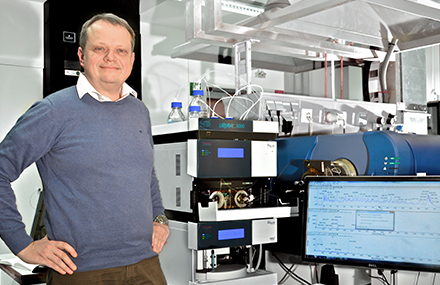Fröhlich Lab - Proteomics
 Research Topics
Research Topics
- Translational proteomics
- Proteomics of reproductive systems
- Microplastics / Ecotoxicoproteomics
DFG: FR 3411/3-3
DFG: SFB 1357 Mikroplastik
Dr. Thomas Fröhlich
phone: +49 (0)89 - 2180 76755
thomas.froehlich@lmu.de
Our research activity comprises proteomic characterization of large animal disease models for molecular biomedical research (Diabetes, Duchenne muscular dystrophy), proteome analysis during early embryogenesis in mammals and secretome analysis of human testicular peritubular cells (HTPC) in the context of spermatogenesis. We perform holistic as well as targeted proteomic approaches using latest mass spectrometry instrumentation. Read more...
Selected Publications
Systemic deletion of DMD exon 51 rescues clinically severe Duchenne muscular dystrophy in a pig model lacking DMD exon 52.
Stirm M, Shashikadze B, Blutke A, Kemter E, Lange A, Stöckl JB, Jaudas F, Laane L, Kurome M, Keßler B, Zakhartchenko V, Bähr A, Klymiuk N, Nagashima H, Walter MC, Wurst W, Kupatt C, Fröhlich T, Wolf E. Proc Natl Acad Sci U S A. 2023 Jul 18;120(29):e2301250120. doi: 10.1073/pnas.2301250120. Epub 2023 Jul 10. PMID: 37428903 PubMed
Progressive Proteome Changes in the Myocardium of a Pig Model for Duchenne Muscular Dystrophy.
Tamiyakul H, Kemter E, Kösters M, Ebner S, Blutke A, Klymiuk N, Flenkenthaler F, Wolf E, Arnold GJ, Fröhlich T.
iScience. 2020 Sep 1;23(9):101516. doi: 10.1016/j.isci.2020.101516. PMID: 32927262 PubMed
Somatic gene editing ameliorates skeletal and cardiac muscle failure in pig and human models of Duchenne muscular dystrophy. Moretti A, Fonteyne L, Giesert F, Hoppmann P, Meier AB, Bozoglu T, Baehr A, Schneider CM, Sinnecker D, Klett K, Fröhlich T, Rahman FA, Haufe T, Sun S, Jurisch V, Kessler B, Hinkel R, Dirschinger R, Martens E, Jilek C, Graf A, Krebs S, Santamaria G, Kurome M, Zakhartchenko V, Campbell B, Voelse K, Wolf A, Ziegler T, Reichert S, Lee S, Flenkenthaler F, Dorn T, Jeremias I, Blum H, Dendorfer A, Schnieke A, Krause S, Walter MC, Klymiuk N, Laugwitz KL, Wolf E, Wurst W, Kupatt C.
Nat Med. 2020 Feb;26(2):207-214. doi: 10.1038/s41591-019-0738-2. PubMed
Detection of collagens by multispectral optoacoustic tomography as an imaging biomarker for Duchenne muscular dystrophy.
Regensburger AP, Fonteyne LM, Jüngert J, Wagner AL, Gerhalter T, Nagel AM, Heiss R, Flenkenthaler F, Qurashi M, Neurath MF, Klymiuk N, Kemter E, Fröhlich T, Uder M, Woelfle J, Rascher W, Trollmann R, Wolf E, Waldner MJ, Knieling F.
Nat Med. 2019 25(12):1905-1915. doi: 10.1038/s41591-019-0669-y. PubMed
Multi-omics analysis of diabetic pig lungs reveals molecular derangements underlying pulmonary complications of diabetes mellitus. Shashikadze B, Flenkenthaler F, Kemter E, Franzmeier S, Stöckl JB, Haid M, Riols F, Rothe M, Pichl L, Renner S, Blutke A, Wolf E, Fröhlich T. Dis Model Mech. 2024 Jun 20:dmm.050650. doi: 10.1242/dmm.050650. Online ahead of print. PMID: 38900131 PubMed
Maternal hyperglycemia induces alterations in hepatic amino acid, glucose and lipid metabolism of neonatal offspring: Multi-omics insights from a diabetic pig model.
Shashikadze B, Valla L, Lombardo SD, Prehn C, Haid M, Riols F, Stöckl JB, Elkhateib R, Renner S, Rathkolb B, Menche J, Hrabĕ de Angelis M, Wolf E, Kemter E, Fröhlich T. Mol Metab. 2023 Jul 4:101768. doi: 10.1016/j.molmet.2023.101768. Online ahead of print. PMID: 37414142 PubMed
Functional changes of the liver in the absence of growth hormone (GH) action - Proteomic and metabolomic insights from a GH receptor deficient pig model. Riedel EO, Hinrichs A, Kemter E, Dahlhoff M, Backman M, Rathkolb B, Prehn C, Adamski J, Renner S, Blutke A, de Angelis MH, Bidlingmaier M, Schopohl J, Arnold GJ, Fröhlich T*, Wolf E*.
Mol Metab. 2020 Mar 18:100978. doi: 10.1016/j.molmet.2020.100978. [Epub ahead of print] * contributed equally PubMed
More publications
Lab News
08.03.2024: New Bruker timsTOF HT mass spectrometer installed
A new high-performance mass spectrometer was recently installed and is now fully operational. This state-of-the-art, very fast scanning mass spectrometer with improved sensitivity includes an integrated TIMS (Trapped Ion Mobility Spectrometry) unit. This enables parallel accumulation serial fragmentation (PASEF) of peptide ions, further increasing the speed and number of proteins quantified.

